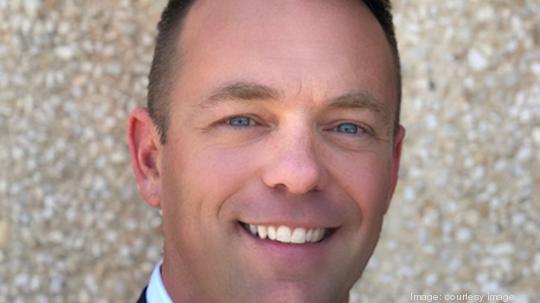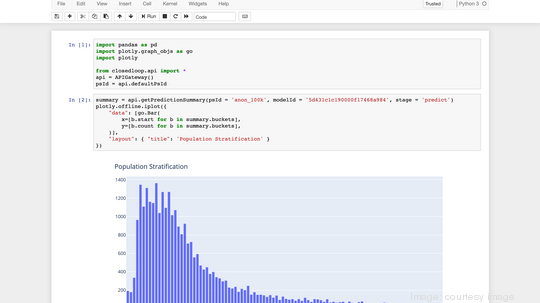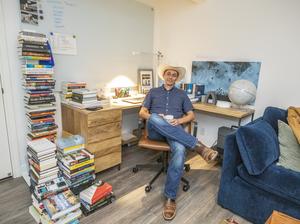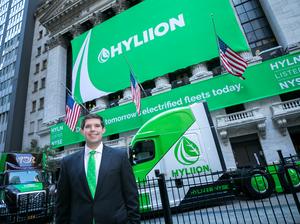
For years now, the buzzword in health care has been "outcomes." It's a one-word way of acknowledging that our health care systems have been largely focused on responding to health problems late in the game instead of preventing diseases and other maladies before they become life-altering problems for both the body and the balance sheet.
This is where Austin-based startup ClosedLoop believes it can make a major difference -- for patients and health care providers. The company uses AI and machine learning to identify risk factors among a group of patients. That might be highlighting patients who haven't refilled prescriptions and may be missing doses, as well as predicting which patients are most likely to need additional care in the near future.
Now the company is starting its next chapter of development, backed by a new, $11 million Series A investment co-led by Greycroft and .406 Ventures, with additional backing from Silicon Valley Bank and Meridian Street Capital. It brings the startup's total funding to around $15 million since its founding in 2017 by CEO Andrew Eye and CTO Dave DeCaprio.
The founders know each other well. DeCaprio, who ran an engineering team for The Human Genome Project, also worked with Eye on Eye's previous startup, Boxer, an email management startup that was acquired by VMware in 2015.
Eye said that DeCaprio has extensive knowledge in machine learning, and helped turn him onto opportunities to use the technology in the health care space. ClosedLoop's AI essentially gives health care providers a way to deduce which patients are most likely to need X -- that could be most likely to be re-admitted to the hospital, or who's most likely to have trouble with transportation to get to follow up appointments.
The platform uses a wide variety of data. For example, it might show those most likely to need help with transportation to appointments based on detailed socio-economic data. Then, it's up to the health care providers to nudge those at high-risk by offering free transportation options or other services that could make them more likely to get the care they need in a timely manner.

"It's our job to sort the spreadsheet," Eye said. "Then the hospital systems or providers or health insurance companies do something special for the people at the top of that list."
For elderly patients, for example, a provider might bring assistive equipment to reduce the chance of a fall getting out of bed.
"This happens already today," he said. "The only question is can AI make those phone calls more efficient? Can they get the right people to the top of the list? Because you can't afford to call everybody. You can't afford to send everybody a free Uber ride. So it's all about prioritizing those limited intervention resources for the people who are really going to benefit."
The startup's SaaS platform has generated significant traction in the niche industry of health care AI.
ClosedLoop is also one of seven finalist in the Centers for Medicare and Medicaid Services' Artificial Intelligence Health Outcomes Challenge, which aims to identify leading technologies that physicians trust. The challenge has $1.6 million prize money attached to it, but Eye said it's not so much about the money as it is about the startup emerging out of a pack of 300 companies that includes heavy hitters, such as IBM.
"This is a huge deal," he said. "We've already beat out IBM, Accenture, Mayo Clinic... these were not small companies that were competing in this challenge. So we're really excited to be in that final seven, and we're the only software provider left standing."
ClosedLoop currently has 23 employees, and it plans to expand its sales and marketing teams. Earlier this year, it added Paul Auffermann, a former VP of sales at DataRobot, as its chief revenue officer. It plans to have 27 employees by the end of the year and 50 by the end of 2021. The company declined to share revenue information.
Early on in the Covid-19 pandemic, ClosedLoop launched a free, open-source self-assessment to demonstrate how it could take basic information and provide an assessment of how likely they are to have major complications from the disease. It also created an enterprise version of its risk assessment, which also used medical claims data.
The data analysis allowed nurses to contact people at very high-risk for a devastating Covid case and provide information about how they can shelter in-place and access services, such as food and supply delivery, to help keep them safe.
Eye said that ClosedLoop has a lot of use cases focused on patients with asthma, heart disease and other common problems. But he's most excited about how the technology could one day help patients go through less pain and with fewer frustrating moments.
He said his daughter was diagnosed with autoimmune hepatitis. At one point, they were close to needing a liver transplant. She's fine now, but Eye said it's an example of how AI can help in all cases -- not just those sorted to the top of a spreadsheet.
"In order to be able to build that autoimmune hepatitis predictor and help those kids with rare diseases, you have to bring the cost of building these models way down. It can't cost $3 million every time you need to make a prediction. You have to bring the cost way, way down if you want to be able to help not just the top 5% of people, but everybody. That's the ultimate opportunity -- AI should be helping in all of these cases."







